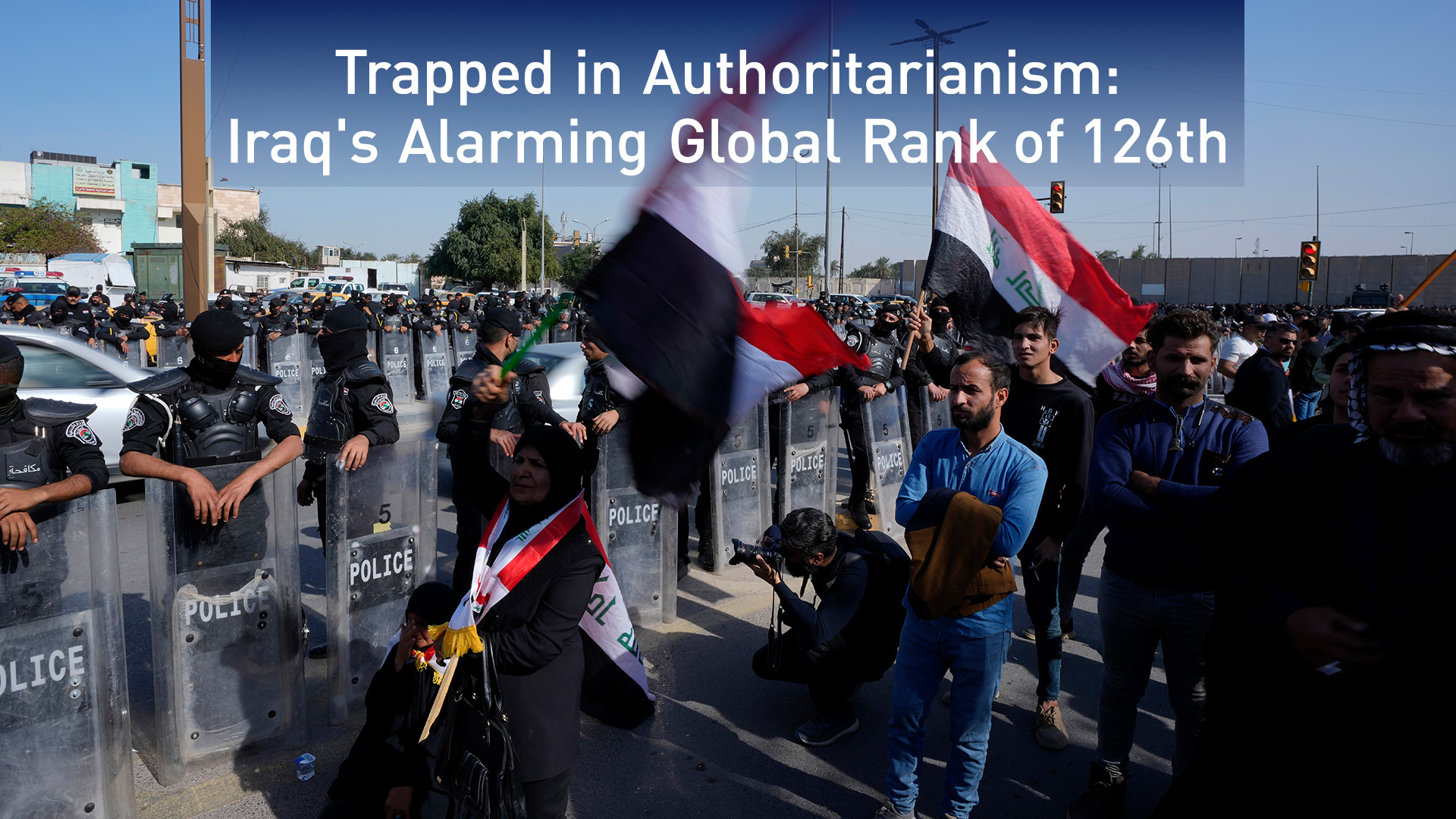Trapped in Authoritarianism: Iraq's Alarming Global Rank of 126th
Iraq's highest-scoring category was electoral process and pluralism, where it received 4.83, a reflection of its nominally competitive electoral system.

ERBIL (Kurdistan24) – The Democracy Index 2024, published by the Economist Intelligence Unit (EIU), paints a bleak picture of the state of democracy in the Middle East and North Africa (MENA), with Iraq classified as an "authoritarian regime" and the region witnessing its sixth consecutive year of democratic decline.
Iraq’s Stagnation in Democracy
Iraq scored 2.80 on the index, ranking 126th globally and 11th in the MENA region.
The country’s highest-scoring category was electoral process and pluralism, where it received 4.83, a reflection of its nominally competitive electoral system.
However, its functioning of government score remained at 0.00, highlighting the severe challenges in governance, institutional efficiency, and political stability. Iraq also performed poorly in civil liberties (1.18), political culture (1.88), and political participation (6.11).
The continued instability in Iraq’s political landscape, driven by sectarian divisions, corruption, and foreign influence, remains a significant impediment to democratic progress. While elections are held, systemic irregularities, voter intimidation, and the influence of armed groups weaken democratic legitimacy.
The weak governance structures and widespread corruption have also fueled public dissatisfaction, leading to protests in recent years demanding political reform and accountability.
The broader Middle East recorded a sharp decline in its average democracy score, falling from 3.23 in 2023 to 3.12 in 2024. This drop underscores the region’s entrenched authoritarianism, political repression, and the failure of democratic experiments.
Tunisia, once seen as the only success story of the Arab Spring, suffered the most significant decline in the region, with its score falling by 0.80 points to 4.71, following President Kais Saied’s consolidation of power and suppression of opposition voices.
Kuwait also saw a dramatic regression, dropping 0.72 points to 2.78 after the dissolution of its National Assembly, marking a significant departure from its historically vibrant parliamentary politics. Qatar also regressed, with its score falling by 0.48 points to 3.17 due to the reversal of democratic reforms.
At the bottom of the regional rankings, Syria (1.32) and Sudan (1.46) remain among the world’s most repressive states, suffering from ongoing civil conflicts and authoritarian rule.
Libya, however, was an exception, showing improvement with a 0.53-point increase, reaching 2.31, attributed to reduced militia infighting and tentative steps toward political reconciliation.
Additionally, Iran is classified as an authoritarian regime in the Democracy Index 2024, scoring 1.96 and ranking 154th globally and 17th in the MENA region.
Iran scored 0.00 in electoral process and pluralism, reflecting the absence of free and fair elections. The country’s functioning of government was rated 2.50, while political participation scored 3.33, suggesting some level of public engagement despite heavy restrictions. Political culture was also 2.50, and civil liberties scored 1.47, indicating a severe lack of fundamental freedoms.
The Democracy Deficit in MENA
The Democracy Index 2024 reaffirms that the MENA region remains the least democratic globally. Representative democracy is scarce, with Israel (7.80) being the only country classified as a "flawed democracy."
Most countries continue to maintain authoritarian structures, where rulers exercise centralized control, and elections—where they occur—are often superficial or manipulated to maintain existing power dynamics.
The erosion of democratic institutions is particularly evident in the region’s weakest category, electoral process and pluralism, where the average score dropped to 1.85 in 2024 from 2.16 in 2023.
This decline reflects increasing restrictions on political competition, the suppression of opposition movements, and electoral processes that lack genuine competitiveness.
Despite the bleak outlook, some countries in the region have shown modest signs of democratic engagement. Jordan recorded a slight improvement in its index score, reflecting incremental political reforms that allowed greater pluralism ahead of the September 2024 parliamentary elections.
The United Arab Emirates also continued its upward trajectory, albeit from a low base, due to limited economic and social liberalization measures.
For Iraq, the path to democratization remains challenging. The country must address deep-seated governance issues, improve institutional independence, and curb external influences that undermine its sovereignty. Enhancing the rule of law, ensuring transparent elections, and fostering a political culture that prioritizes national unity over sectarian divisions will be critical to advancing democracy.
As the Democracy Index 2024 highlights, the MENA region remains trapped in an enduring cycle of authoritarianism and stagnation. While isolated improvements exist, the overall trend continues to move away from democracy, reinforcing the urgent need for political reforms to bridge the region’s widening democratic deficit.